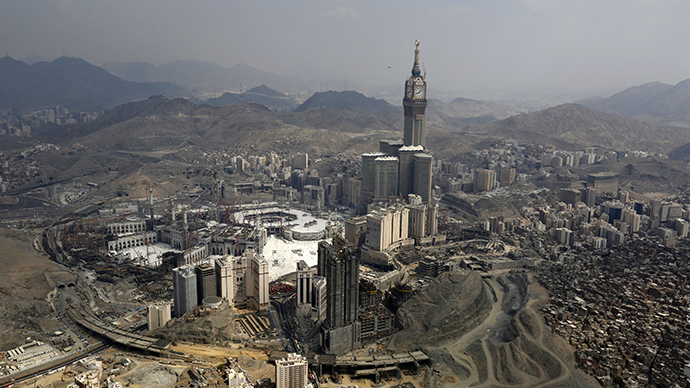By Catherine Shakdam
The very country which brought the world one of the most brutal and intolerant religious ideologies - Wahhabism, while operating the most oppressive modern-day theocracy, is vying for the presidency of the UN Human Rights Council.
Saudi Arabia has come to represent many things over the decades - theocracy, oppression, brutality and even at times downright barbarism. And seeing how the Kingdom has become infamous for carrying out death sentences by beheading, it’s safe to say that upholding the principles of human rights is not exactly the regime’s forte.
Yet, King Salman, the new self-proclaimed custodian of the Two Holy Mosques, did not flinch when he declared on May, 20 that, “The Saudi Arabian government guarantees freedom of expression and opposes discrimination.”
The comment was aimed at Bandar Al-Aiban, president of the Human Rights Commission (HRC), Mufleh Al-Qahtani, president of the National Society for Human Rights, and other senior officials during their visit to Riyadh.
The King went on confidently, “The pillars of this state are built on Islamic law that calls for the protection of human rights; and governance in the country is based on justice, consultation and equality.”
But since those pillars the King is so keenly referring to are themselves based on the Wahhabi interpretation of Islam - a sect by its very nature reactionary and fiercely oppressive towards all it does not approve of or understand – Saudi Arabia’s justice system is merely a reflection of such dystopian ideology.
Wahhabism is actually so intrinsically violent and foreign to the concept of interfaith cohesion and peaceful social coexistence that it gave birth to the so-called jihadist movement that is currently holding the Middle East and North Africa hostage – Islamic State (IS, formerly ISIS/ISIL).
Wahhabism is a sect that came to be in the 18th century at the command of Mohammed Abdel-Wahhab. To put things further into historical context, the Wahhabis, or the Ikhwan as they called themselves then, under the banner of Wahhabism raided and ransacked both the holy city of Karbala (Iraq) and Medina before marching into Mecca as conquerors. Those “faithful” hordes turned Arabia crimson red to the swing of their blades as they pillaged and massacred along the way.
Fast forward a few centuries and Wahhabism is as bloodthirsty and intolerant as ever.
When all which is not Wahhabi Islam is considered apostasy, talks of equality and justice are as intangible as mirages - and yet the Kingdom would like the world to believe in its gospel of justice.
Not content with professing the righteousness of his rule, King Salman now harbors ambitions for the Kingdom to head the United Nations Human Rights Council.
On the very same week Saudi Arabia called for “experienced swordsmen” to join the Kingdom’s execution squad, reports confirmed Riyadh is preparing to lobby the United Nations to become the next head of the Human Rights Council, after Germany’s term end in 2016.
As Hillel Neuer, executive director of UN Watch said, “that would be the final nail in the coffin for the credibility of the HRC.”
Neuer added rather eloquently, “Electing Saudi Arabia as the world’s judge on human rights would be like making a pyromaniac as the town fire chief.”
And indeed, in a country like Saudi Arabia, where women are no more than commodities to be traded off, where political prisoners are subjected to abject torture, and where beheadings are commonplace, the idea that such a regime could ever be granted such a position on the world stage rings with intolerable cynicism.
Since King Salman was declared the legitimate claimant to the throne of Saudi Arabia, 85 men and women have been put to death in macabre public displays. Among the Kingdom’s latest victims was a woman suspected of mental illness named Siti Zainab Binti Duhri Rupa. She was publicly beheaded in April.
Philip Luther, Middle East and North Africa Programme Director at Amnesty International, said at the time in a statement: “Imposing the death penalty and executing someone with a suspected mental illness smacks of a basic lack of humanity.” But, of course, such condemnations and calls for restraint have mainly fallen on deaf ears since the Kingdom wields the most powerful weapon of all - petrodollars.
Saudi Arabia, it appears, cannot be made to abide by international standards, since international law does not hold sway over the Kingdom. If the world has somewhat come to terms with the principles of American exceptionalism, perhaps the era of all-encompassing Saudi impunity is now at hand - Saudi Orwellianism anyone?
And even if both the US and EU insist on courting Riyadh – for its coffers are home to billions of dollars in arm deals and other lucrative investments – it would be difficult to whitewash 85 state-sanctioned murders, one unilateral war on Yemen, and a brutal religious crackdown against the Kingdom’s Shia community.
And if, as King Salman claimed, “There is no difference between citizens or regions. All citizens are equal in rights and duties,” then why are religious figureheads like Sheikh Al Nimr languishing in prison?
Is it fairness when cluster-bombs are unleashed over Yemen’s northern region of Saada where, as it so happens, Zaidi Muslims are the majority - a branch of Islam Wahhabi clerics have branded as takfir (infidels)? Is it right when children are left to starve under a Riyadh-run blockade on Yemen?
Allowing the Kingdom to head the UN Human Rights Council would quite simply equate to rewarding inhumanity, but then again, since values such as civil liberties and human rights have become the latest casualties in the Western powers’ eternal ‘war on terror’, maybe a theme is beginning to emerge.
Back in 2013, the US and EU failed to oppose Saudi Arabia’s election to the council. Let us see how they hold up before the petrodollar super-power this time around.
/149

